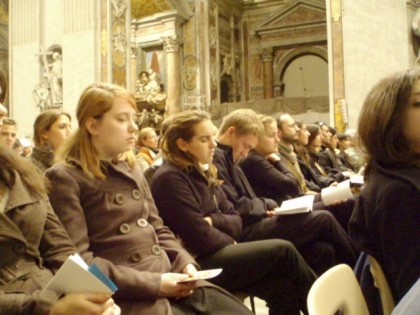What is Reverence, Exactly?
Devra Torres | Jan 6, 2015
Every Sunday at the Community Bible Chapel, my sister and I used to sing the hymns in Pig Latin. We’d also sneak under the pew in front of us and stealthily crawl forward, sometimes almost all the way up to the altar, under the legs of the congregation. (Badly behaved Protestant kids have this advantage over badly behaved Catholic ones: no kneelers to get in their way.)

In short, we were blatantly irreverent.
We were six and four at the time, so there was some excuse. But whether our behavior was reverent or not was no mystery.
With grownups, things get murkier. When we try to pinpoint what reverence and irreverence look like in different situations, we can go wrong in a couple different ways.
- The more traditional mistake is to imagine that reverence or lack thereof is something you can observe with the naked eye. It has to do with your posture, the volume and tone of your voice, and other readily apparent signs. To teach children to be reverent is to teach them to tuck in their shirts and stand up straight and stop yelling in the middle of the sermon. (Probably not all children need to be instructed to sing in English and refrain from scuttling around on the floor.) To be irreverent is to wear jeans and slouch.

- The less traditional misunderstanding is to imagine that reverence has nothing to do with matters like posture or volume, to believe that because it’s a spiritual attitude, the way it’s expressed (or not) by the body is entirely irrelevant. Anyone troubled about appearances is just being "holier than thou."
But this is another one of those pesky either/or’s that wreak such havoc on the world. Reverence is neither solely physical nor solely spiritual. First of all, you can certainly achieve perfection in posture and volume and everything else pertaining to the “outward appearance” and still be far from real reverence. Then again, choosing to slouch your way through the Consecration when you’re supposed to be kneeling is not a sign of authenticity, but just bad manners and refusal to bestow honor where honor is due.
So reverence can’t be reduced to an inner or an outer attitude.
Complicating the situation is that, as with modesty, people have a powerful tendency to focus on whether other people's conduct is up to snuff. Just as you can't judge a person's heart by the length of her skirt, you can't ascertain someone's reverence by the elegance of his bearing.

But more to the point, reverence is simply a response to a reality. A society that loses reverence loses more than good manners: it loses touch with things in themselves.
Reverence isn’t just for religious occasions, either, though it is expressed in specific ways when it comes to liturgy. We’re moved to reverence for God, but also for each other, and creation, and truth, when we see them—at least a little bit—for what they are. What we love, we revere. We’re inspired to reverence when we manage to get out of ourselves, even slightly--when we're bowled over by (or at least cognizant of) the majesty of something, or someone, or Someone, outside ourselves.
That's tricky to do these days. Irony, sarcasm, and cynicism make reverence hard to come by. And we devote so much time and energy to entertaining ourselves that we end up treating other people and their ideas like the show, and ourselves like the critics hired to pick it apart.
I don't know if I've come a long way since the Community Bible Chapel or not. but I'm working on it.
